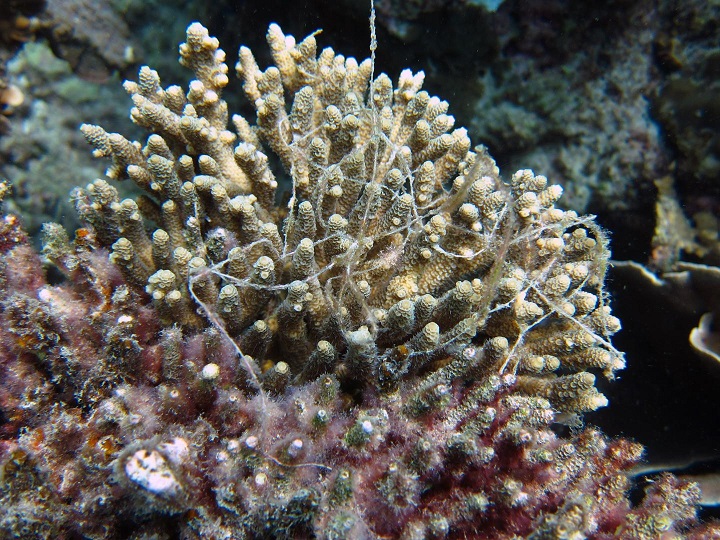Great Barrier Reef marine reserves combat coral disease
A new and significant role for marine reserves on the Great Barrier Reef has been revealed, with researchers finding the reserves reduce the prevalence of coral diseases.
It's been known for some time that marine reserves are important for maintaining and enhancing fish stocks, but this is the first time marine reserves have been shown to enhance coral health on the Great Barrier Reef.
Researchers from the ARC Centre of Excellence for Coral Reef Studies at James Cook University found that coral disease levels were four times lower inside no-take marine reserves, where fishing is banned, compared to outside reserves.
"We surveyed more than 80,000 corals around the Whitsunday Islands for six different diseases that commonly harm reef corals around the world," says study lead author, Dr Joleah Lamb from the Coral CoE.
"We found three coral diseases were more prevalent on reefs outside no-take marine reserves, particularly on reefs with high levels of injured corals and discarded fishing line. "
Wounded corals are more vulnerable to disease. Damaged tissue provides sites where pathogens and parasites can invade, particularly as coral immune responses are lowered while they heal.
Dr Lamb says once a pathogen infects a coral, tissue loss typically spreads from the point of entry.
"It's like getting gangrene on your foot and there is nothing you can do to stop it from affecting your leg and ultimately your whole body."
"Disease outbreaks can take a heavy toll, with losses of up to 95 per cent of coral cover on some reefs in the Caribbean."
Given the difficulty identifying pathogens that cause disease, the researchers say it's vital to understand which activities increase the risk of coral diseases, and to protect against them.
They say discarded fishing line and levels of coral breakage, potentially from a variety of fishing-related activities, outside the no-take zones on the Great Barrier Reef are indicators of the types of activities that contribute to the problem.
"Fishing line not only causes coral tissue injuries and skeleton damage, but also provides an additional surface for potential pathogens to colonise, increasing their capacity to infect wounds caused by entangled fishing line," Dr Lamb says.
The researchers hope their findings send a clear message to reef managers about the benefits of marine reserves for coral health.
"No take marine reserves are a promising approach for mitigating coral disease in locations where the concentration or intensity of fishing effort is relatively high," says Professor Garry Russ from the Coral CoE.
Professor Bette Willis, also from the Coral CoE, says the scientists are now expanding their research to examine other drivers of coral disease.
"We've shown that there are strong links between damage and disease in this study, now we're interested in understanding and managing other potential drivers of diseases that involve injury- such as outbreaks of crown-of-thorns starfish, cyclones, and recreational activities like anchoring."
Source: ARC Centre of Excellence in Coral Reef Studies
Environment
-
Arctic gives clues on worst mass extinction of life
-
Specialized life forms abound at Arctic methane seeps
-
Marine carbon sinking rates confirm importance of polar oceans
-
Ocean warming and acidification impact on calcareous phytoplankton
-
Watching a forest breathe
-
Microplastic particles threaten fish larvae
-
Honeybees pick up 'astonishing' number of pesticides via non-crop plants
-
West Coast scientists sound alarm for changing ocean chemistry
-
Herpes outbreak, other marine viruses linked to coral bleaching event
-
Tough times for the tree of life on coral reefs
-
Rapid plankton growth in ocean seen as sign of carbon dioxide loading
-
Lab experiments question popular measure of ancient ocean temperatures
-
Bering Sea hotspot for corals and sponges
-
Great Barrier Reef marine reserves combat coral disease
-
Brazilian beef industry moves to reduce its destruction of rain forests



